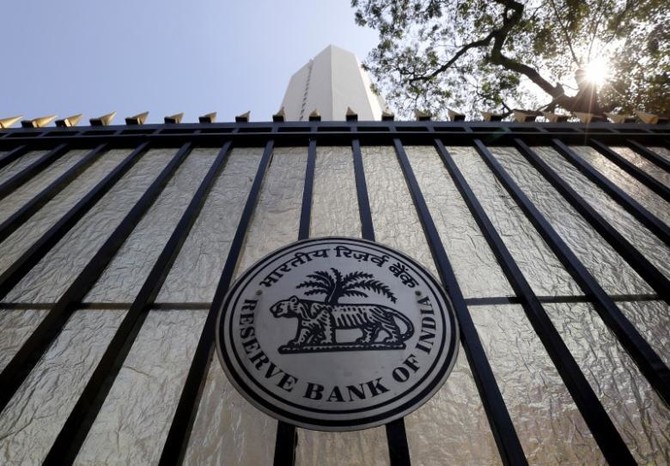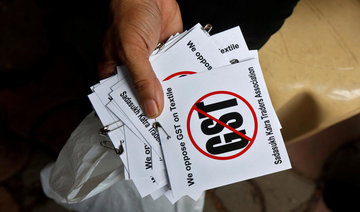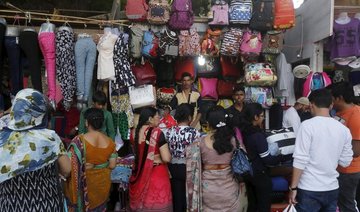MUMBAI: The Reserve Bank of India kept its policy rate steady on Wednesday, as widely expected, after inflation accelerated to a seven-month high and stronger economic growth reduced the need for monetary stimulus.
All but two of 54 analysts in a Reuters poll had predicted the repo rate would be left unchanged for a second straight meeting at 6.00 percent, its lowest since November 2010.
The RBI also kept the reverse repo rate unchanged at 5.75 percent.
The decision to stand pat was widely expected after the annual rate of consumer inflation increased in October to 3.58 percent, driven by higher food and crude oil prices. That’s still low by Indian standards, but not far from the central bank’s 4 percent target.
Nonetheless, the RBI left its policy stance “neutral” while slightly softening its language on inflation by saying risks were “evenly balanced.”
Many analysts believe the RBI will keep rates on hold in coming months, including at its next policy meeting in February, as it watches inflation trends.
“The global policy rate cycle and (rising) commodity prices, along with the consolidated fiscal position, will keep the RBI cautious,” said Suvodeep Rakshit, a senior economist with Kotak Institutional Equities in Mumbai.
Government officials have been calling on the RBI to cut rates given the economy, though recovering from July’s bumpy launch of a national sales tax, is not yet growing fast enough to create the jobs needed for India’s young workforce.
“We have a neutral stance, which means that depending on the data flow in coming months and quarters we’ll determine what we do regarding the policy,” RBI Governor Urjit Patel told a news briefing after the decision.
“All possibilities are on the table, and we would look carefully at both the inflation data and growth data that comes in coming months.”
Five members of the Monetary Policy Committee (MPC) voted to keep rates unchanged, while one voted for a 25 basis point (bp) cut.
Indian bond prices have slumped in recent weeks as investors sharply pared expectations for rate cuts.
The central bank took advantage of an extraordinary period of low inflation, including a slump in food and energy prices, to cut rates by a total of 200 bps from January 2015 until August this year, when it last cut the repo by 25 bps.
But those factors are now reversing, with crude prices rallying and food prices expected to climb further.
Moreover, a growing number of global central banks, including most recently South Korea’s, are tightening policy, with the US Federal Reserve expected to hike rates again next week.
There is also growing uncertainty on whether the government will have to borrow more as it struggles to meet its fiscal deficit target, which could add to price pressures.
On Wednesday, the RBI slightly raised its inflation projection by 10 bps to between 4.3 percent and 4.7 percent in the six months ending in March 2018.
It also retained its projection for gross value added growth, a measure of economic expansion it prefers, at 6.7 percent for the year ending in March, the same as its forecast in October.
India’s economic growth rebounded to 6.3 percent in the three months ending in September, halting a five-quarter slide.
Bond markets took solace that the statement was not as hawkish as some had feared after the recent spike in inflation.
The yield on the benchmark 10-year bond yield slid 3 bps to 7.04 percent from around 7.07 percent before the policy decision. It had risen more than 60 bps since the RBI’s Aug. 2 policy meeting.
But the rupee weakened to 64.49 per dollar from around 64.47 before the RBI’s statement, while the broader NSE share index fell 0.7 percent for day, mostly before the rate announcement.
India’s central bank keeps policy rates
India’s central bank keeps policy rates

‘The age of electricity’: WEF panel says geopolitics is redefining global energy security

- Surging demand, critical minerals, US-China rivalry reshaping energy security as nations compete for influence, infrastructure, control over world’s energy future
LONDON: Electricity is rapidly replacing oil as the world’s most strategic energy commodity, and nations are racing to secure reliable supply and influence in a changing energy landscape.
Global electricity demand is growing nearly three times faster than overall energy consumption, driven by artificial intelligence, electric vehicles, and rising use of air-conditioning in a warming world.
“We are entering the age of electricity,” said Fatih Birol, the executive director of the International Energy Agency, during a panel discussion titled “Who is Winning on Energy Security?” at the World Economic Forum in Davos on Tuesday.
Unlike oil, electricity cannot be stockpiled at scale, forcing governments and companies to prioritize generation, transmission, and storage, making regions with stable infrastructure increasingly important on the global stage.
US-China rivalry
Energy security is increasingly about control and influence, not just supply. The rivalry between the US and China now extends beyond oil to critical minerals, energy infrastructure, and long-term energy partnerships.
“The contrast between the US approach and China’s is stark,” said Meghan O’Sullivan, director of Harvard University’s Belfer Center. “The US, until recently, focused on access, not control. China flips that, seeking long-term influence and making producers more dependent on them.”
O’Sullivan highlighted China’s Belt and Road Initiative, which invests in energy infrastructure and critical minerals across Africa, Latin America, and Asia to secure influence over production and supply chains.
“It’s not just the desire to control oil production itself, but to control who develops resources,” she said, citing Venezuela as an example. The South American nation holds some of the world’s largest crude oil reserves, giving it outsized geopolitical importance. Recent US moves to expand influence over Venezuelan oil flows illustrate the broader trend that great powers are competing to shape who benefits from energy resources, not just the resources themselves.
“There’s no question that the intensified geopolitical competition between great powers is playing out in more competition for energy resources, particularly as the energy system becomes more complex,” O’Sullivan added.
Global drivers of the electricity era
The rise of electricity as a strategic commodity is also transforming global supply chains. Copper, lithium, and other minerals have become essential to modern energy systems.
“A new ‘energy commodity’ is copper,” said Mike Henry, CEO of BHP. “Electricity demand is growing three times faster than primary energy, and copper is essential for wires, data centers, and renewable energy. We expect a near doubling, about a 70 percent increase in copper demand over 25 years.”
Yet deposits are harder to access, refining is concentrated in a few countries, and supply chains are politically exposed.
“The world’s ability to generate electricity reliably will increasingly depend on materials and infrastructure outside traditional oil and gas markets,” Birol said.
AI and digital technologies amplify the challenge with large-scale data centers consuming enormous amounts of electricity.
The Middle East’s strategic relevance
While the global focus is on electricity demand and great-power rivalry, the Middle East illustrates how traditional energy hubs are adapting.
Majid Jafar, the CEO of Crescent Petroleum, highlighted the region’s enduring advantages: abundant reserves, low-carbon potential, and strategic geography.
“Geopolitical instability reinforces, if anything, the Middle East’s role as a supplier with scale, affordability, availability, and some of the lowest carbon reserves,” he said.
Jafar emphasized the region’s ability to navigate the growing US-China rivalry.
“Amid US-China global friction, the Middle East has managed to remain on good terms with both sides,” he said, noting that flexible policy and engagement help preserve influence while balancing competing interests.
The region is also adapting to the electricity-driven era. AI data centers and digital technologies are multiplying power needs. Jafar said: “One minute of video consumes roughly an hour’s electricity for an average Western household. Multiply that across millions of servers and billions of people and the scale is staggering.”
Infrastructure investments further strengthen the Middle East’s strategic position. In the Kurdistan Region of Iraq, the Runaki Project has expanded natural gas–fueled power plants to provide 24/7 electricity to millions of residents and businesses, reducing reliance on diesel generators and supporting economic growth.
According to Jafar, the combination of energy resources, capital, leadership, and agile policymaking gives the Middle East a competitive edge in meeting global electricity demand and navigating the complex geopolitics of energy.
While the panel highlighted the Middle East as one example, in the age of electricity, energy security is defined as much by influence and infrastructure as by barrels of oil, with the US-China rivalry determining who gains and who is left behind.














